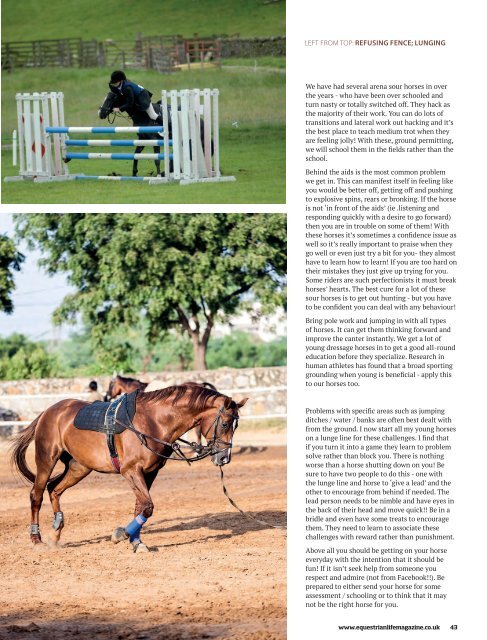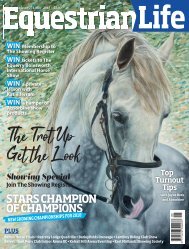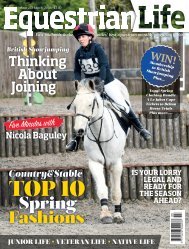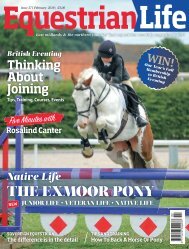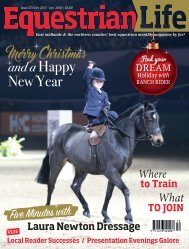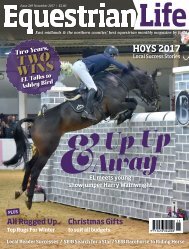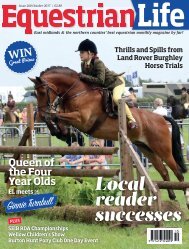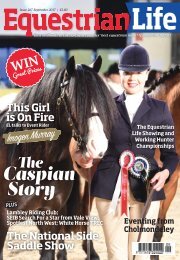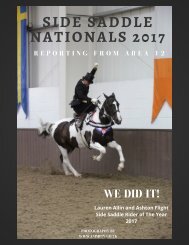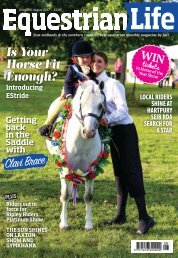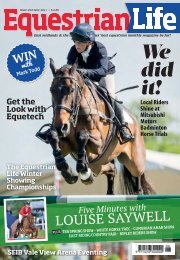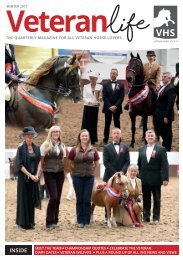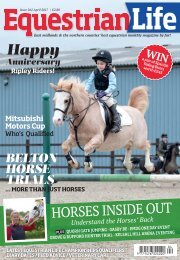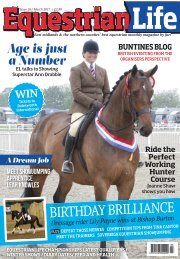Equestrian Life April 2018 Issue
Your leading monthly magazine for all horse lovers and riders
Your leading monthly magazine for all horse lovers and riders
You also want an ePaper? Increase the reach of your titles
YUMPU automatically turns print PDFs into web optimized ePapers that Google loves.
LEFT FROM TOP: REFUSING FENCE; LUNGING<br />
We have had several arena sour horses in over<br />
the years - who have been over schooled and<br />
turn nasty or totally switched off. They hack as<br />
the majority of their work. You can do lots of<br />
transitions and lateral work out hacking and it’s<br />
the best place to teach medium trot when they<br />
are feeling jolly! With these, ground permitting,<br />
we will school them in the fields rather than the<br />
school.<br />
Behind the aids is the most common problem<br />
we get in. This can manifest itself in feeling like<br />
you would be better off, getting off and pushing<br />
to explosive spins, rears or bronking. If the horse<br />
is not ‘in front of the aids’ (ie .listening and<br />
responding quickly with a desire to go forward)<br />
then you are in trouble on some of them! With<br />
these horses it’s sometimes a confidence issue as<br />
well so it’s really important to praise when they<br />
go well or even just try a bit for you- they almost<br />
have to learn how to learn! If you are too hard on<br />
their mistakes they just give up trying for you.<br />
Some riders are such perfectionists it must break<br />
horses’ hearts. The best cure for a lot of these<br />
sour horses is to get out hunting - but you have<br />
to be confident you can deal with any behaviour!<br />
Bring pole work and jumping in with all types<br />
of horses. It can get them thinking forward and<br />
improve the canter instantly. We get a lot of<br />
young dressage horses in to get a good all-round<br />
education before they specialize. Research in<br />
human athletes has found that a broad sporting<br />
grounding when young is beneficial - apply this<br />
to our horses too.<br />
Problems with specific areas such as jumping<br />
ditches / water / banks are often best dealt with<br />
from the ground. I now start all my young horses<br />
on a lunge line for these challenges. I find that<br />
if you turn it into a game they learn to problem<br />
solve rather than block you. There is nothing<br />
worse than a horse shutting down on you! Be<br />
sure to have two people to do this - one with<br />
the lunge line and horse to ‘give a lead’ and the<br />
other to encourage from behind if needed. The<br />
lead person needs to be nimble and have eyes in<br />
the back of their head and move quick!! Be in a<br />
bridle and even have some treats to encourage<br />
them. They need to learn to associate these<br />
challenges with reward rather than punishment.<br />
Above all you should be getting on your horse<br />
everyday with the intention that it should be<br />
fun! If it isn’t seek help from someone you<br />
respect and admire (not from Facebook!!). Be<br />
prepared to either send your horse for some<br />
assessment / schooling or to think that it may<br />
not be the right horse for you.<br />
www.equestrianlifemagazine.co.uk 43


